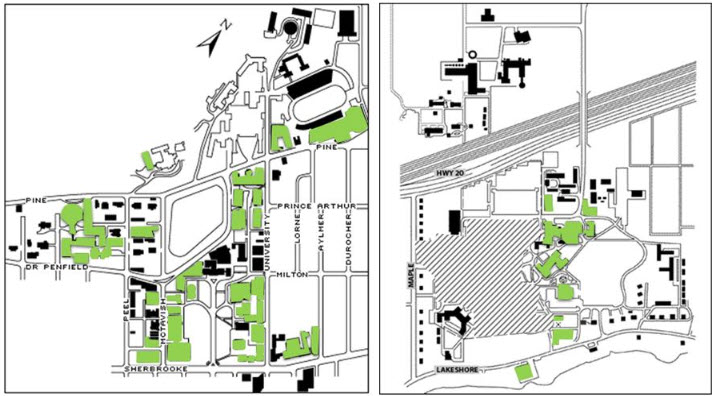
McGill, as a world-class research and teaching institution, has a very high energy use intensity and a sizeable carbon footprint. McGill uses more energy per square foot compared to peer institutions in Canada but compares favourably in terms of greenhouse gas emissions. Indeed, when normalized to gross building area or student enrolment, McGill’s building-related greenhouse gas emissions are in fact 50% below the 1990 levels.
Since 2010, the University has invested $20M in energy conservation and managed to reduce energy use intensity and building-related greenhouse gas emissions respectively by 26% and 34% below the 2002-2003 reference baseline defined by the Québec Ministry of Higher Education.
Recently, the provincial government set ambitious targets for institutions to reduce their energy use and carbon footprint. In parallel, McGill is working on a plan to become carbon neutral. To respond to these requirements, Utilities & Energy Management hereby proposes a 2016-2020 iteration of McGill’s Energy Management Plan that will focus on the transition of buildings from static energy consumers to dynamic smart grids and pave the way to a carbon-neutral energy transition. Expected impacts include a 22% reduction in energy use intensity below the provincial government-newly defined 2012-2013 baseline as well as a 64% reduction in building-related greenhouse gas emissions below the 1990 levels. Investments in energy conservation in the order of $22M have been identified to reach these targets. Annual savings upon implementation are estimated at $3.99M for an overall payback of 4.3 years and a net present value calculated over 20 years of $14.89M.
![]() Energy Management Plan – 2016-2021 [executive summary]
Energy Management Plan – 2016-2021 [executive summary]
![]() Energy Management Plan – 2016-2021 [full text]
Energy Management Plan – 2016-2021 [full text]